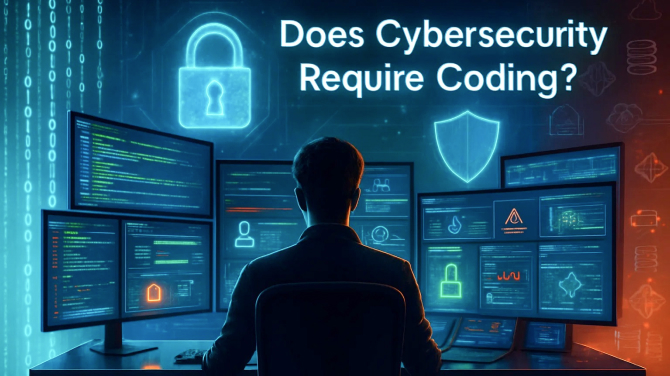To get success in the field of cybersecurity, all you need is the right mindset. However, it can also be a rewarding career path filled with scope for remunerative and positional growth. The answer to the question “Is Cyber Security Hard” varies from one person to another. For some students, cyber security can be a tough field while for others, it can be quite easy. If you love the world of technology, get joy in solving tricky technical problems, and enjoy learning new technologies, you will find that cybersecurity is a worthy and engaging challenge to pursue.
If you are looking to build a career in this industry, it is quite natural to feel overwhelmed by the aspect of learning various concepts and technical skills. A few of these skills might be tricky and require a lot of hard work. Adopting the right action and mentality might be key for a rewarding career path.
What Is Cybersecurity?
Cybersecurity can be considered as the method of protecting mobile devices, electronic platforms, computers, networks, servers, and data from nefarious sources. Such cyberattacks generally gain accessibility to confidential data, alter it significantly, or even delete it. Furthermore, gaining access to high profile corporate data can allow attackers to demand ransom from the attackers or manipulate corporate processes. Individual users and businesses leverage this technique to prevent unauthorized access to computerized platforms and data centers. A profound cybersecurity plan can ensure robust security systems against nefarious cyberattacks.
Is Cyber Security Hard to Learn?
Similar to any other profession, learning cyber security is not too difficult if you are ready to invest the required time and energy into it. Professionals and students exploring cybersecurity must understand that it does not require intricate arithmetic. Thus, in a way, it is a lot easier to understand than other core technical subjects. You can easily become a proficient cyber security engineer if you inculcate technological expertise, problem-solving abilities, and other skill sets.
Ensuring continuity is the trickiest challenge in the cybersecurity field. Irrespective of the level of experience you currently have, it is important to consistently improve yourselves and stay up to date with industrial trends to remain competitive. What you need to figure out is whether your interest in cybersecurity comes naturally to you. You must be willing to embrace present challenges, evolving trends, and robust cyber security practices in order to remain competitive.
How Soon Can I Become a Cybersecurity Expert?
Becoming an expert in any field takes years of study and practice. However, if you dedicate yourself to cybersecurity courses for a year or two, you can easily enter the profession. It is imperative to realize that learning cybersecurity takes more time than learning any programming language. If you are targeting to enter the profession with just three months of study, then you are setting yourself up for failure. Your existing skill sets, and your technical background also determine how long it will take you to become a cybersecurity professional. If you choose to pursue a bachelor’s degree, it can take 3-4 years. A master’s degree will take a couple more years.
If you are going the route of self-education, then you must be ready to dedicate a couple of years. Your technical knowledge, communication skills, and general awareness must be strong in order to be eligible for a job in the cybersecurity industry.
Strategies to Become a Professional in Cyber Security Industry
Understand the common strategies to become a successful professional in the cyber security domain:
Develop Your Fundamentals with a Basic Course-
Though self-study is crucial for building skill sets in cyber security, a professional course will take you far. Apart from helping you develop foundational skill sets in a structured format of learning; a professional course will enable you to gain hands-on experience in the field. Enrolling in this course will also help you figure out whether information security is the correct career choice for you. A professional course gives you the much-needed exposure to see whether cybersecurity aligns with your interests and career goals.
Measure Whether You Have the Right Passion for Technology-
Cybersecurity can be a complex subject, but so is everything else. However, things will become easy for you if you have the requisite passion for the world of technology. Develop an affinity toward the devices and tools you are utilizing on a daily basis. Once you develop a natural interest, you will see that challenging abilities become much easier and simpler. For some, a few hours of study are enough to invigorate an interest in a subject. Ultimately, you must understand that cybersecurity can be a challenging, interesting, and rewarding career path. However, it is not for everyone.
Learn Something Everyday-
Entering the cybersecurity industry is a monumental project. However, if you dedicate yourself to learning something valuable on a daily basis, it will make things easier for you. Working on cybersecurity skillsets does not mean that you have to leave your job for a full-time degree or dedicate yourself to a full-time boot camp. Even if you decide to give yourself 30 minutes daily to concentrate on cybersecurity, you can significantly elevate your skill set over time. Strategize your learning time and make the best use of your leisure time.
Apart from that, allocating specific learning hours is also a great idea. However, you must have a proper plan in place that will guide you on what you should study in each session. Set specific tasks, for example, take the quiz on chapter 3, watch a couple of online lectures, or study chapter 4.
Develop Ethical Hacking Skillsets-
One of the effective ways of learning a concept is through practicing. In the context of cybersecurity, one way to gain exposure is through practicing ethical hacking. It will not only make you familiar with important tools and technologies but also make you familiar with real-world practices.
As you continue to work on your skill sets, you must actively search for big bounty programs. In these programs, organizations offer cash prizes to participants who can recognize and report security flaws. It is an effective way to not only test your proficiency with real-world problems but also grow your professional network.
Practice Your Cybersecurity Knowledge in Simulated Environments-
Numerous courses in cybersecurity involve online labs to test your skill sets in simulated environments, leveraging real security systems. You can gain access to these labs as part of your professional course. However, you must establish your own virtual lab to practice as much as you want. A basic environment generally includes three main elements:
- Target machines to direct cyberattacks.
- A cloud environment for hosting virtual machines.
- An attack machine or box you can utilize to strategize and perform your attacks.
Work on Your Soft Skills-
If you get tired from developing and practicing your technical knowledge, you can start working on your soft skills instead. As a professional in cybersecurity, you will often find yourself explaining tricky concepts to people. Sometimes, you will have to explain highly technical concepts to individuals who do not have a technical background. Thus, fluent communication skills and the ability to explain complex topics in a user-friendly way are valuable additions. There might also be situations where you have to make important decisions in a few minutes. Thus, critical thinking skills are also necessary.
On the internet, you can find plenty of resources to work on your soft skills. You can explore blogs, podcasts, YouTube videos, etc.
Research Interview Questions-
Carry out intense research on the kind of questions that get asked in a cybersecurity interview. Prepare yourself to give detailed answers to all the questions. Since you will be a fresher, you must be sound on the fundamentals, basic threats, and industrial practices. You can showcase your portfolio of personal projects related to cybersecurity if you have done any to make an impression on the interviewer. An interviewer can also check your awareness of recent cybersecurity trends and events. Apart from that, you can also demonstrate your analytical skillsets and problem-solving.
Furthermore, questions related to cybersecurity are also a part of IoT interview questions.
Conclusion
Is cyber security hard? Well, the answer depends on your dedication, passion, and mindset. Cyber security can offer a rewarding career path to professionals ready to boost their technical knowledge, enhance problem-solving skills, and adapt to evolving security tools and threats.
While a few aspects can be tough to grasp, overall cybersecurity is not too difficult to understand. What matters is your perseverance and dedication to enhance your skill sets. Don’t think too much about how hard is cybersecurity. Keep in mind that with continuous practice, right strategies, and problem-solving proficiency, everything becomes manageable. So, start your learning today!
For your technical knowledge, you can also explore our blog section to find useful technical topics.







